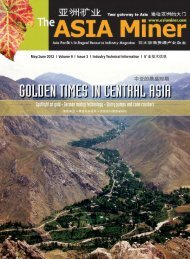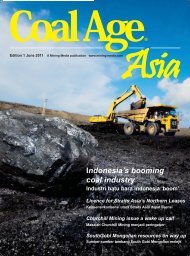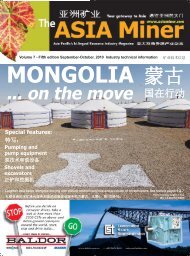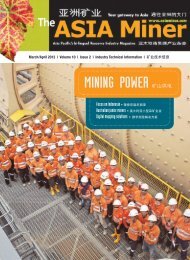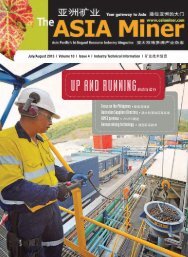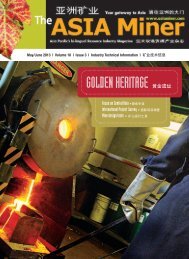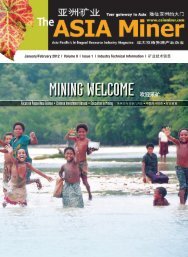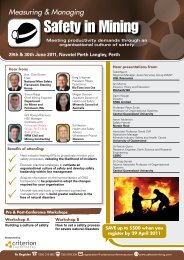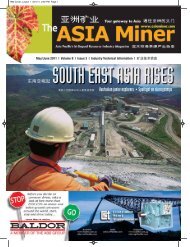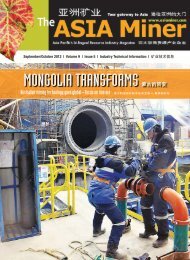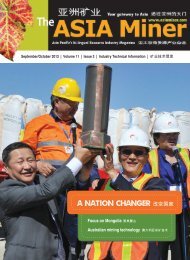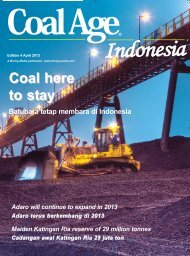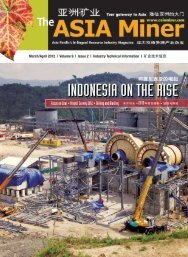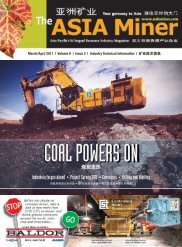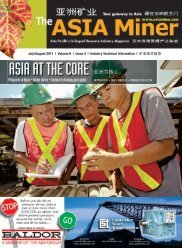Australia's junior explorers - The ASIA Miner
Australia's junior explorers - The ASIA Miner
Australia's junior explorers - The ASIA Miner
Create successful ePaper yourself
Turn your PDF publications into a flip-book with our unique Google optimized e-Paper software.
AN interesting recent development for the<br />
sluggish nickel industry has come in the form<br />
of the Indonesian gover nment’s new tax on<br />
unprocessed mineral ore exports, which may<br />
boost prices and increase pressure on supply.<br />
<strong>The</strong> new tax on the export of 14 types of<br />
unprocessed minerals came into ef fect on<br />
May 6 and has been intr oduced in a bid to<br />
boost value-added products.<br />
<strong>The</strong> minerals affected are gold, silver, platinum,<br />
copper, lead, nickel, zinc, ir on ore<br />
and sand iron, manganese, chromium, molybdenum,<br />
bauxite and antimony. <strong>The</strong>re has<br />
been mixed response within Indonesia and<br />
further afield with concern expressed that it<br />
will affect miners’ revenue and significantly<br />
affect profit margins.<br />
<strong>The</strong>re have certainly been mixed messages<br />
about the impact on nickel with some companies<br />
to benefit and others to be impacted<br />
negatively. <strong>The</strong> government has made exceptions<br />
for miners that alr eady have or plan to<br />
New Indonesian tax may benefit nickel<br />
build smelters. <strong>The</strong>y will be taxed at an average<br />
of 20% on ore exports.<br />
Companies like Vale Indonesia, the country’s<br />
biggest nickel miner, won’t be affected<br />
because they process ore into refined products.<br />
But other companies will be impacted,<br />
including state-controlled Antam, which<br />
obtains about 30% of its r evenue from ore<br />
shipments. To process raw nickel, Antam<br />
plans to build a $1.6 billion ferronickel smelter<br />
in East Halmahera.<br />
Some companies may end up holding back<br />
ore shipments if the new levy makes mining<br />
unprofitable and might focus on building<br />
smelters instead. This could, in turn, lift nickel<br />
prices and put pressure on supply. Kim Eng<br />
Securities in Jakarta said in a note to clients<br />
that the imposition of an export duty on mineral<br />
ores would curb cheap nickel ore supply<br />
and, in turn, stoke a nickel price rally.<br />
China International Capital Corp also for ecasts<br />
a boost in nickel prices but says large<br />
EPA recommends approval for Wiluna<br />
THE Western Australian Environmental Protection<br />
Authority (EPA) has r ecommended<br />
approval for Toro Energy’s Wiluna Uranium<br />
Project. <strong>The</strong> EPA has presented a report and<br />
recommendations to Western Australia’s Minister<br />
for Environment. Toro is awaiting the<br />
Minister’s decision following review of any appeals<br />
that are raised.<br />
<strong>The</strong> project was referred for assessment to<br />
the Western Australian and Federal gover nments<br />
in October 2009. An Environmental Review<br />
and Management Program was exhibited<br />
for public consultation over 14 weeks from July<br />
2011 with 48 submissions made to the EP A.<br />
Toro has provided comprehensive responses<br />
to all submissions to enable the EPA to finalize<br />
its assessment. A Federal Gover nment decision<br />
on its assessment is anticipated after the<br />
Western Australian process is finalized. Toro’s<br />
Board will then target a final investment decision<br />
by the end of 2012, subject to final market<br />
and economic considerations.<br />
“<strong>The</strong> EPA recommendation is an important<br />
milestone for Toro and for the W estern Australian<br />
uranium industry,” Toro’s managing<br />
director Greg Hall says. “While the Toro team<br />
members have significant experience within<br />
other uranium and mining operations, Wiluna<br />
is Toro’s first project and the first uranium project<br />
to receive a positive EPA recommendation<br />
in Western Australia since the change of<br />
government in 2008. Toro is confident that its<br />
extensive technical and environmental study<br />
work and the rigorous assessment undertaken<br />
by the EPA will ensure a safe and sustainable<br />
mining operation. This project is one of<br />
the few in the world potentially capable of<br />
commencing production in the critical<br />
2014/15 period when the nuclear industry will<br />
be seeking additional supplies.”<br />
Toro’s Wiluna project is about 520km north of Kalgoorlie<br />
in central Western Australia. It comprises uranium in the<br />
Centipede and Lake Way deposits.<br />
Asian Intelligence<br />
By <strong>The</strong> <strong>ASIA</strong> <strong>Miner</strong> editor, John Miller<br />
stockpiles in China will limit short-term impacts<br />
of any supply shortfall. It says the tax<br />
is expected to add 7.5% to average production<br />
costs of nickel pig ir on in China, improving<br />
incentives to use refined nickel at current<br />
price levels. About 60% of China’ s pig iron<br />
output, which accounts for 60% of the nation’s<br />
nickel production, relied on Indonesian<br />
laterite ores last year.<br />
In a research note, analysts at Citi said the<br />
outlook for nickel was ‘significantly mor e<br />
positive’ thanks to Indonesia’s moves. “Expectations<br />
of reductions in exports range<br />
from 20% per cent to 75% by the fourth<br />
quarter of 2012.<br />
<strong>The</strong> Philippines might also pick up any<br />
slack in shipments caused by the ban. A<br />
Mines and Geosciences Bureau official said<br />
recently that nickel-ore production and exports<br />
from the Philippines may rise this year,<br />
benefiting from Indonesia’s ban. Australia is<br />
another country that could benefit.<br />
Lynas has LAMP appeal dismissed<br />
AN appeal lodged under the Atomic Energy<br />
Licensing Act in relation to the decision<br />
of the Malaysian Atomic Energy<br />
Licensing Board to approve the issuance<br />
of a temporary operating licence (TOL) for<br />
the Lynas Advanced Materials Plant<br />
(LAMP), has been dismissed.<br />
In dismissing the appeal, the Minister of<br />
Innovation, Science and Technology, YB<br />
Dato’ Seri Panglima Dr Maximus Johnity<br />
Ongkil affirmed the February 1, 2012 decision<br />
of the Boar d to appr ove the issuance<br />
of the TOL. L ynas has r eadily<br />
available solutions to satisfy the new conditions<br />
announced by the Minister . <strong>The</strong><br />
next step will be the tabling and debate of<br />
the Parliamentary Select Committee’s Report.<br />
Lynas looks forward to completion of<br />
the regulatory and political pr ocesses in<br />
Malaysia as soon as possible.<br />
“<strong>The</strong> decision by the Minister is the<br />
latest in a long line of rulings and approvals<br />
where Lynas has been assessed<br />
and judged to have complied<br />
with Malaysian and international regulatory<br />
standards,” says Lynas executive<br />
chairman Nicholas Curtis.<br />
July/August 2012 | <strong>ASIA</strong> <strong>Miner</strong> | 5



